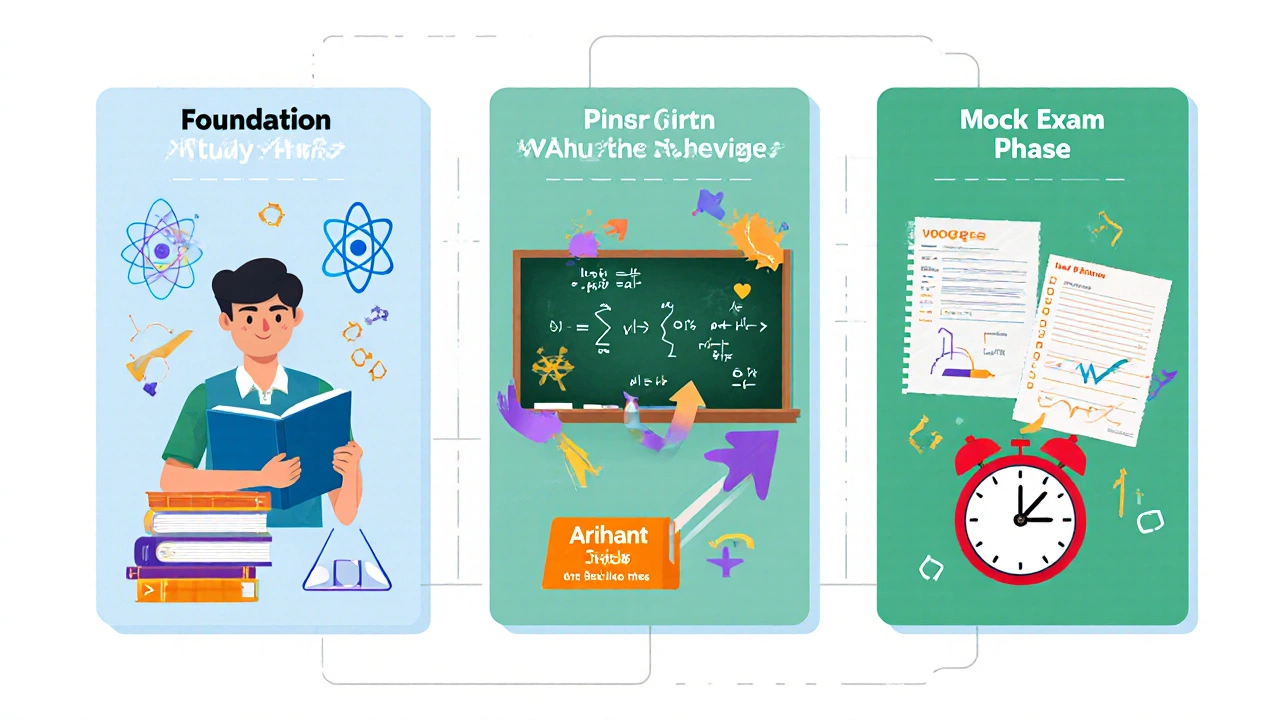JEE Mains Book Selection Guide
Personalized Book Recommendations for JEE Mains 2025
Answer a few questions to get the perfect book recommendation for your preparation strategy.
Your Personalized Recommendation
Why This Recommendation?
How to Use This Book Effectively
Choosing the right study material can make or break your JEE Mains score. With dozens of titles flooding the market, you need a clear roadmap to spot the best JEE Mains book for your strengths, weak spots, and exam timeline. Below you’ll get a practical guide that walks you through selection criteria, the five most trusted titles for 2025, a side‑by‑side comparison, and actionable tips on how to pull the most mileage from any book you pick.
What makes a JEE Mains book truly useful?
Before diving into specific titles, it’s worth understanding the attributes that separate a good book from a great one. Keep these five factors in mind while you compare options:
- Alignment with the latest syllabus: JEE Mains 2025 introduced nuanced changes in the weightage of Chemistry organic sections and added a few conceptual physics questions. A solid book reflects these updates.
- Depth of theory vs. practice balance: Beginners need clear explanations; aspirants targeting top ranks crave challenging problem sets.
- Quality of solved examples: Step‑by‑step solutions help you spot common pitfalls.
- Number of practice questions: Aim for at least 500+ MCQs per subject plus full‑length mock tests.
- Price and accessibility: Students often combine multiple books; a cost‑effective bundle is a bonus.
Top 5 JEE Mains Preparation Books for 2025
Each of the following titles has earned a reputation among toppers, coaching institutes, and online forums such as Pagalguy and Quora. They’re listed in the order of overall popularity, not ranking; your personal fit may differ.
HC Verma - Concepts of Physics (Vol1 &2) is a classic physics resource that many students still consider the backbone of JEE prep. It offers clear conceptual explanations followed by a wide range of problems, from basic to Olympiad level. The latest 2025 edition adds a new chapter on quantum basics, aligning with the updated syllabus.
Arihant - Skills in Physics for JEE Main focuses on rapid problem‑solving techniques. Every chapter ends with 50 short‑answer questions designed for timed practice.
O.P. Tandon - Physical Chemistry provides a systematic approach to chemical equations and kinetic theory. The 2025 revision adds a set of 75 new MCQs on organic reaction mechanisms.
Resonance - Mathematics for JEE Main (Vol1 &2) is praised for its logical progression and extensive exercise bank. The book includes 600+ practice problems, with a separate section for 2025‑specific topics like differential equations in three variables.
NCERT Textbooks (Physics, Chemistry, Mathematics) remain the foundation for any JEE aspirant. All JEE questions are derived from NCERT concepts, making them indispensable for building a strong base.
Comparison Table - Quick Look at Features
| Book | Subject Coverage | Difficulty Level | # of Practice Questions | Price (INR) | Best For |
|---|---|---|---|---|---|
| HC Verma - Concepts of Physics | Physics (both Theory & Numericals) | Medium‑Hard | ~800 | 800 | Students who need solid concepts before intense practice |
| Arihant - Skills in Physics | Physics (Short‑answer focus) | Easy‑Medium | ~500 | 450 | Speed‑training and quick revisions |
| O.P. Tandon - Physical Chemistry | Chemistry (Physical & Organic) | Medium | ~650 | 600 | Conceptual clarity in reaction mechanisms |
| Resonance - Mathematics | Mathematics (Algebra, Calculus, Geometry) | Medium‑Hard | ~900 | 900 | Students aiming for high‑score problem solving |
| NCERT Textbooks | All three subjects | Easy | Built‑in exercises (≈300 per book) | 200 | Foundation building for every aspirant |

How to Use Your Chosen Book Effectively
Owning a great book isn’t enough; a disciplined approach determines the outcome. Follow this three‑phase plan:
- Foundation Phase (Weeks1‑4): Start with the NCERT textbooks. Complete every example, then solve the end‑of‑chapter questions without looking at solutions.
- Concept‑Depth Phase (Weeks5‑12): Switch to the subject‑specific titles (HC Verma, O.P. Tandon, Resonance). Read a chapter, take notes, and immediately attempt the 10‑15 practice problems provided. Use the solution keys to spot mistakes.
- Mock‑Exam Phase (Weeks13‑20): Pull together the short‑answer books (Arihant Skills) for timed practice. Simulate a full JEE Mains paper every weekend, then review errors using the detailed solutions from the longer books.
Stick to a daily schedule of 2‑3 hours per subject, and keep a log of topics you’re weak at. Rotate subjects to avoid burnout and always revise old problems on weekends.
Common Mistakes to Avoid When Picking a Book
- Skipping the NCERT: Many students think a single “all‑in‑one” book can replace NCERT. The exam’s conceptual roots are embedded in those textbooks.
- Buying the newest edition blindly: If the price jump is huge, compare the table of contents with the previous edition-often the updates are marginal.
- Relying solely on solved examples: Practice without looking at solutions at least once per chapter to build confidence.
- Ignoring difficulty level: A book that’s too easy will waste time; one that's too hard will demotivate you.

Frequently Asked Questions
Frequently Asked Questions
Should I buy both HC Verma and Arihant Physics?
Yes, if your budget allows. HC Verma gives deep concepts, while Arihant offers rapid‑review problems. Use HC Verma for learning a topic, then switch to Arihant for timed practice.
Are online PDFs as good as printed books?
For theory reading, PDFs work fine, but solving problems on paper helps you develop speed and reduces eye strain during mock tests. A hybrid approach works best.
How many practice papers should I attempt before the exam?
Aim for at least 6 full‑length mock tests-one every two weeks. Review each test thoroughly; the learning comes from analyzing mistakes.
Can I rely only on coaching institute notes?
Coaching notes are great for shortcuts, but they often skip underlying theory. Combine them with a solid book like NCERT or HC Verma to avoid gaps.
What’s the best way to track my progress?
Maintain a spreadsheet with columns for topic, number of problems attempted, correct answers, and time taken. Update it daily; the visual trend keeps you motivated.
Key Takeaways
- Start with NCERT, then layer on HC Verma (Physics), O.P. Tandon (Chemistry), and Resonance (Maths) for depth.
- Use Arihant’s short‑answer books for speed drills and mock‑test simulations.
- Match the book’s difficulty to your current skill level; avoid extremes.
- Maintain a steady study schedule and track performance with a simple log.
- Invest wisely-sometimes the previous edition offers the same content at a fraction of the cost.

